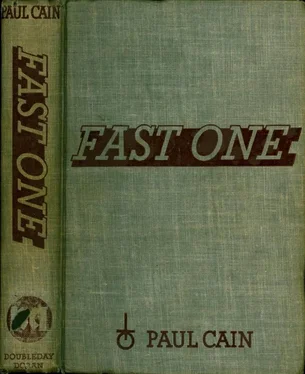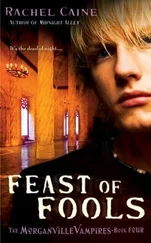It was a quarter after one. Kells checked his watch with the clock in the lobby, thanked the clerk and went out to the car. He got in and sat beside Borg, grunted: “No luck.”
They had taken Gilroy home — Faber had stayed with him.
Borg asked: “Where to?”
Kells sat a little while silently staring at nothing. He finally said: “Drive down toward Long Beach.”
Borg started the car and they went down the dark street slowly. The fog was very thick; street lights were vague yellow blobs in the darkness.
Kells tapped Borg’s knee suddenly. “Have you ever been out to Fay’s boat?”
Borg hadn’t. “I ain’t much of a gambler,” he said. “I went out to the Joanna D. once, before it burned up — with a broad.”
“Do you remember how to get to the P & O wharf?”
Borg said he thought so. They turned into the main highway south. After about a half-hour, they turned off into what turned out to be a blind street. They tried the next one and had just about decided they were wrong again when Borg saw the big white P & O on the warehouse that ran out on the wharf. They parked the car and walked out to the waiting room.
Kells asked the man in the office if the big red-faced man who ran one of the launches to the Eaglet was around.
The man looked at his watch. “You mean Bernie, I guess,” he said. “He oughta be on his way back with a load.”
They sat down and waited.
Bernie laughed. He said: “You ain’t as wet as you were the last time I saw you.”
Kells shook his head. They walked together to the end of the wharf.
Kells asked: “You know Jack Rose when you see him?”
“Sure.”
“When did you see him last?”
Bernie tipped his cap back, scratched his nose. “Night before last,” he said, “when you and him went out to the Joanna.”
“If you were wanted for murder in LA and wanted to get out of the country for a while how would you do it?”
“I don’t know.” Bernie spat into the black water alongside the wharf. “I suppose I’d make a pass at Mexico.”
“If you were going by car you wouldn’t be coming through Pedro.”
“No.”
“But if you were going by boat?”
Bernie said: “Hell, if I was going by boat I wouldn’t go all the way to Mexico. I’d go out and dig in on China Point.”
Kells sat down on a pile. “I’ve heard of it,” he said. “What’s it all about?”
“That’s God’s country.” Bernie grinned, stared through the sheets of mist at the lights of the bay. “That’s the rum runners’ paradise. All the boys in the racket along the coast hang out there. They come in from mother ships — and the tender crews... I’ll bet there’s a million dollars’ worth of stuff on the island. They steal it from each other to keep themselves entertained...”
“How long since you were there?”
“Couple years — but I hear about it. They got a swell knockdown drag-out café there now — the Red Barn.”
Kells said: “It isn’t outside federal jurisdiction.”
“No. A cutter goes out and circles the island every month or so. But they pay off plenty — nobody ever bothers ’em.”
“That’s very interesting,” Kells stood up. “How would Rose get out there?”
Bernie shook his head. “A dozen ways. He’d probably get one of the boys who used to run players to the Joanna to take him out. It’s a two-hour trip in a fast boat.”
They walked back toward the waiting room.
Kells said: “It’s an awfully long chance. Do you suppose you could get a line on it from any of your friends?”
“I don’t think so. I know a couple fellas who worked for Rose and Haardt, but with Rose wanted they wouldn’t open up.
Bernie took out a knife and a plug of tobacco, whittled himself a fresh chew.
Kells said: “Try.”
“Okay.”
They went into the waiting room and Bernie went into the telephone booth.
Borg had found a funny paper. He looked up at Kells, said, “I’ll bet the guys that get up these things make a pile of jack — huh?”
Kells said they probably did.
Borg sighed. “I always wanted to be a cartoonist,” he said.
Bernie came out of the booth in a little while. “There’s a man named Carver got a string of U Drive pleasure boats down at Long Beach,” he said. “He says a couple men and a woman hired one about eight-thirty and ain’t come back yet. One of ’em sounds like Rose. The other was a little guy; and the woman, he don’t know about — she was bundled up.”
Kells smiled as if he meant it, said: “Come on.”
“We wouldn’t get out there till daylight in my boat. Maybe I can borrow the Comet — I’ll go see.”
Bernie went out, came back in a few minutes shaking his head.
“He wants fifty dollars till ten in the morning,” he said. “That’s too damn much.”
Kells took a sheaf of bills out of his pocket, peeled off two.
“Give him whatever he wants out of this,” he said. “And does he want a deposit?”
“No.” Bernie started for the door. “He keeps my boat for security.”
Kells and Borg followed him out, across the wharf, across a rickety foot bridge and down to a wide float.
Bernie gave the man who was waiting there one of the bills, said: “I’ll pick up the change when I come back.”
The man asked: “Don’t you want me to come along?”
Bernie glanced at Kells.
Kells said: “Thanks — no. We’ll get along.”
The Comet was a trim thirty-foot craft; mahogany and steel and glistening brass. She looked very fast.
Bernie switched on the running lights and started the engine. The man cast off the lines; Bernie spun the wheel over and they swung in a wide curve away from the float and out through the narrows to the cut that led to the outer bay.
The fog was broken to long trailing shreds. The swell was long, fairly easy.
Bernie snapped on the binnacle light. “I hope I ain’t forgot the course,” he said. “I think it’ll clear up when we get out a ways — but I’m usually wrong about fog.”
Borg said, “That’s dandy,” with dripping sarcasm.
Kells went down into the little cabin, lay down on one of the bunks and watched the red and green and yellow buoy lights slide swiftly by the portholes. After a while they rounded the breakwater and there weren’t any more lights to watch.
Kells was awakened by Bernie whispering: “We made it in an hour and fifty minutes.” Then Bernie went outside.
It was very dark. Borg was lying in the other bunk, groaning faintly.
Kells said: “What the hell’s the matter?”
Borg didn’t answer.
“You aren’t sick!” Kells was emphatically incredulous.
It was quiet for a minute and then Borg said slowly: “Who’s the best judge of that — me or you?”
Kells got up and went outside. Bernie had doused the running lights; there was a thin glow from the binnacle — and darkness. The fog felt like a wet sheet.
Bernie said: “There’s a big cruiser tied up on the other wharf I coasted by close — I don’t think there’s anybody aboard.”
“Any other boats?”
“I couldn’t see any.” Bernie switched off the binnacle light. “There’s another little cove on the other side of the island, but nobody uses it.”
Kells said: “We’re not tied up, are we?”
“Sure.”
Kells looked at Bernie admiringly. “You’re a wonder. It didn’t even wake me up.”
Bernie chuckled. “You’re damn right I’m a wonder.” They climbed up on the wharf, crossed quietly. The cruiser was big, luxurious, evidently deserted — Bernie couldn’t make out the name. Except for a few rowboats and the Comet, it was the only boat at the wharf. Kells said: “Well — I guess I’m wrong again.” They walked up the wharf, and Bernie found a path and they walked along the bottom of a shallow gully, up to the left across a kind of ridge.
Читать дальше












